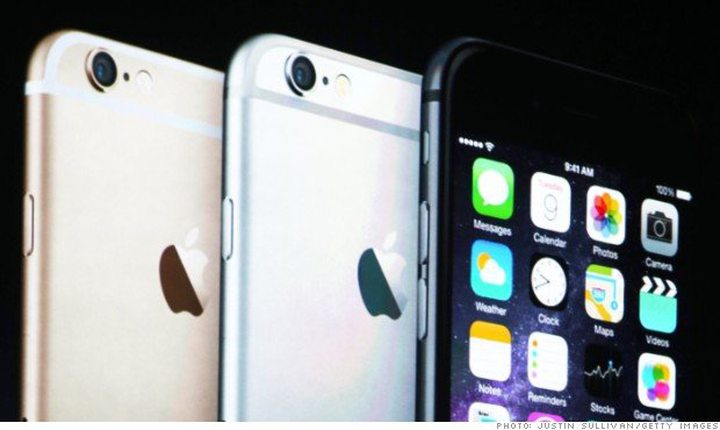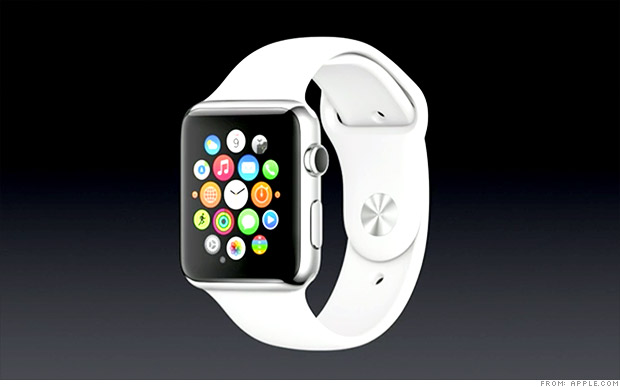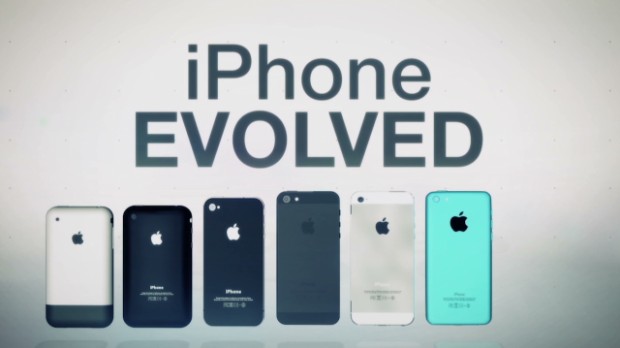Apple Shows Off Smartwatch, Larger-Screen iPhones

iPhone 6
In an ambitious blitz of new products unveiled a pair of larger-screen iPhones, an Internet-connected watch and a new payment system that allows users to make in-store purchases with a smart device.
The watch, called Apple Watch, represents the company's first new product in more than four years. Apple said the watch will start at $349 and be available in early 2015. It works through a connection to Apple's new iPhone 6 and 6 Plus, unveiled Tuesday, as well as the older iPhone 5, 5c and 5s.
The wearable device comes in two sizes and three versions: Watch, Sport and Edition. Apple is offering several different straps and faces, allowing multiple designs.

Apple Chief Executive Tim Cook called the watch the most-personal device Apple has created. The device allows new ways for users to communicate from their wrists, the company said, and includes sensors that can detect a pulse, count steps and suggest fitness goals.
The new iPhones, meanwhile, will have 4.7-inch and 5.5-inch displays, larger than its current four-inch screen. Apple said it expects the new phones—to be called iPhone 6 and iPhone 6 Plus—to go on sale on Sept. 19.
"Today, we are launching the biggest advancement in the history of iPhone," Mr. Cook said.

Apple said it plans to sell the larger 5.5-inch model starting at $299 with a two-year carrier contract, higher than the $199 price for its current high-end iPhone 5S. The company said the 4.7-inch iPhone will start at $199 with a contract. The company said the new phones come with many hardware improvements, including a sharper display, better battery life and improved camera performance.
The company also unveiled a new digital-payments service that will allow consumers to make purchases using just their phones or watches, marking the company's first big push into brick-and-mortar payments.
Apple said it hopes to speed up the checkout process, make credit-card payments more secure and, ultimately, to replace physical wallets. The company said it is using a technology known as near-field communication, or NFC, that works by transmitting a radio signal between the device and a receiver, when the two are fractions of an inch apart or touching.
Apple said "Apple Pay," as the new payments service is known, will be able to store credit cards from Visa Inc, MasterCard Inc and American Express Co. on the latest iPhones and Apple Watch and will work at stores like Macy's, Bloomingdale's, McDonald's MCD and Whole Foods, among others.
Mobile payments, in general, have failed to take hold despite attempts from the likes of eBay Inc., Google Inc., wireless companies, and a host of buzzy startups. Not many physical stores yet accept mobile payments or stored credit cards on smartphones, known as digital wallets, meaning consumers are still carrying the plastic versions.

An effort by Google to create a digital wallet linked to NFC chips in some Sprint phones failed to gain much traction; other carriers favor their own NFC joint venture called Softcard, previously Isis.
Despite those hurdles, Apple seems to have big ambitions for its payments effort. "Apple Pay will forever change the way we buy," Mr. Cook said.
The most noticeable upgrade for the phones is the larger displays. Apple has stuck with a smaller display for its iPhone, even as competitors started making larger screens a standard feature for high-end phones. The feature is especially popular in China and other emerging markets where the smartphone is replacing the PC as the primary computing device.
The absence of a large screen was becoming a liability for Apple as it tried to maintain its dominant hold on the high-end smartphone market. Phones with screens larger than 5 inches accounted for nearly 40% of global smartphone shipments in the second quarter, up from 21% a year earlier, according to market researcher Canalys.
Apple's main smartphone rival Samsung Electronics Co. has pushed aggressively into larger-size smartphones, using the bigger screen as a key differentiator from the iPhone. For smartphones with screens of 5 inches or larger, Samsung is the leader, with 34% of the market, according to Canalys.
Apple pushed the price of its high-end iPhone higher, even as other manufacturers feel pricing pressure on smartphones. Apple's iPhone is already more expensive than nearly all of its competitors. Before the price increase, research firm IDC estimated that the world-wide average selling price of an iPhone will be $657 this year, compared with $254 for phones using Google Inc.'s Android operating system.
The price increase comes as U.S. carriers wean customers off upfront discounts that masked the real price of the iPhone. Instead, carriers are pushing subscribers to pay the full price of the iPhone in installments. This approach, however, could help Apple in the short term because subscribers can get new phones without paying any money down.
In a note published on Friday, Bernstein Research analyst Toni Sacconaghi estimated that the new iPhones will sell 182 million units in Apple's fiscal year starting in October, marking an estimated 9% increase from the prior year. Mr. Sacconaghi said he expects a "more pronounced upgrade cycle with the iPhone 6 than Apple has seen historically."
The iPhone announcement comes as Apple is trying to prove that it can still deliver the type of groundbreaking products that vaulted it from the brink of bankruptcy to become the world's most valuable company by market capitalization. It established itself as a leading innovator by redefining the mobile phone in 2007 with the iPhone, and the tablet computer in 2010 with the iPad.
By revealing new hardware products together with service offerings, Apple is trying to show how it can create experiences that can't easily be replicated by competitors, to keep users loyal at a time when Google's Android mobile-operating system runs about 85% of smartphones.
Mr. Cook started raising expectations for a wave of new products in October 2013, when he told investors they would see "some exciting new products from us in the fall of this year and across 2014." In April, he said he felt "really great" about forthcoming products.





